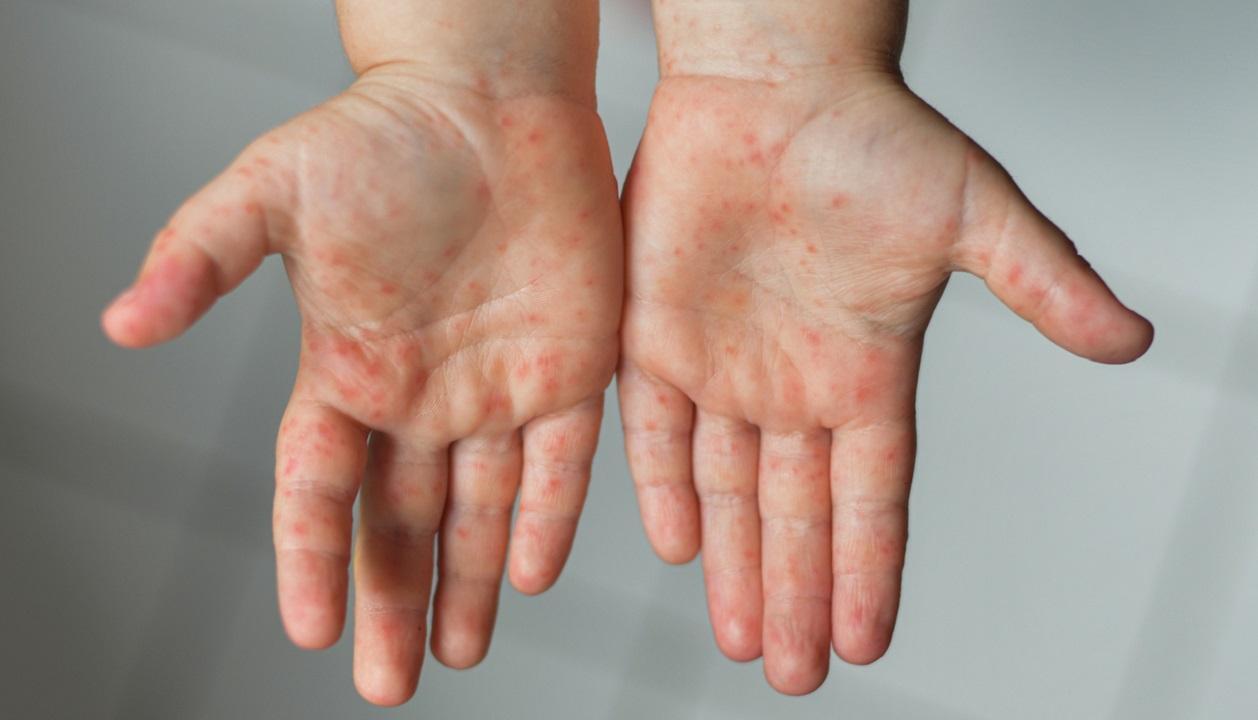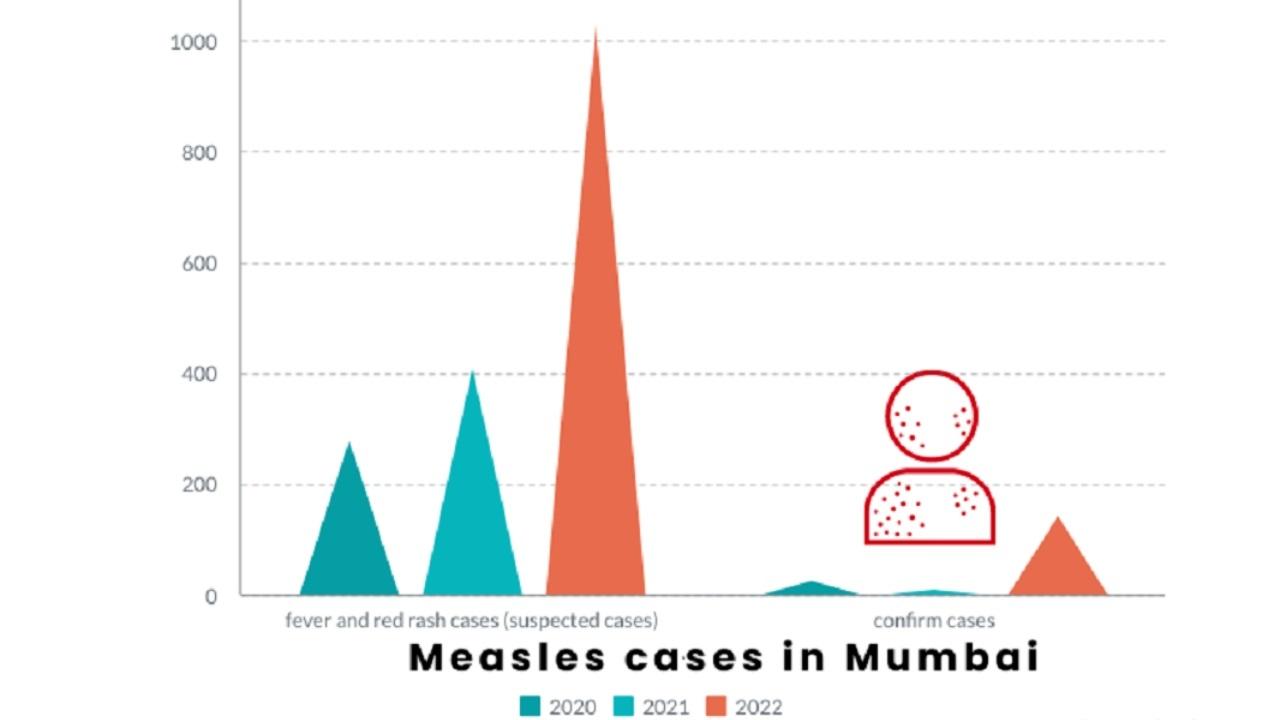In Mumbai this year, 1079 suspected cases of fever and rashes have been reported and 142 confirmed cases. As there has been an increasing number of suspected measles cases daily, the following is a breakdown of everything you need to know about this infectious disease

Representative Image
After the measles outbreak in Mumbai’s slum pockets, the civic body has been on the alert and geared up to tackle the spread of the infectious disease. Till November 15, seven suspected deaths due to measles have been reported by the Brihanmumbai Municipal Corporation (BMC) in the city.
While earlier, Govandi (M/E ward) in Mumbai was reported to be the hotspot of the measles outbreak, the BMC has now listed slum pockets in other wards - E (Byculla), F/N (Matunga), G/South (Prabhadevi), P/North (Malad West), M/W (Chembur), L (Kurla) and H/E (Bandra, Santacruz) to also be the hotspots for reporting suspected cases in Mumbai.
In Mumbai this year, 1,079 suspected cases of fever and rashes have been reported and 142 confirmed cases. As there has been an increasing number of suspected measles cases daily, the following is a breakdown of everything you need to know about this infectious disease.
According to the Maharashtra government’s website, measles is a highly infectious illness caused by a virus that can be found in the nose, mouth or throat of an infected person.
What is measles? and how does it spread?
It is a viral infection caused by Moribilivirus. It can infect only humans and spreads from human to human through close contact. The virus is transmitted through the air by respiratory droplets expelled by infected individuals during coughing and sneezing.
Also Read: Measles outbreak: Besides Govandi, slums in Kurla, Chembur, Malad, Bandra at high-risk
What are the symptoms?
Speaking about the symptoms to look out for, Dr Vaidehi Dande, Consultant Neonatologist and Paediatrician, Symboisis Hospital, said, “Infection starts with high-grade fever along with severe rhinitis and conjunctivitis (red eyes) and eye discharge. Fever resolves by the fourth day and characteristic rash appears starting from ears and face and then spreading to trunk and abdomen.”
She added, “Infection in itself is self-limiting but complications happen in upto five per cent of those who get infected, complications are more common and more severe in unvaccinated children.”
The state government also mentions that the infection is characterised by fever, cough and spreading rash that may lead to death due to secondary infections like diarrhea and pneumonia.
Which age group people are at high risk?
Speaking about the high-risk age group, Dr Sulaiman Ladhani, Consulting Chest Physician, at Masina Hospital said, “Measles most commonly affects children under the age of five and pregnant women. If their immunity is low and these people are not vaccinated at the appropriate time, they are at a higher risk of exposure. If they come into contact with affected people in communities, the outbreak is much faster.”
Also Read: Measles outbreak: Govandi citizens send legal notice to Maharashtra govt
“Besides kids and pregnant women, people with compromised immune systems, such as from leukemia or HIV infection and the elderly population too can be at high risk,” said Dr Dande.
What are the health complications of measles in kids and pregnant women?
Middle-ear infections, pneumonia, brain infection/encephalitis which can lead to permanent hearing loss and epilepsy, diarrhea and malnutrition, and reactivation of tuberculosis, to name a few, Some of these complications are life-threatening.
“If there are any symptoms, an early referral must be made to hospitals because complications of measles can be very life-threatening and lead to various complications such as encephalitis, blindness, diarrhea, uncontrolled pneumonia, and deafness,” added Dr Ladhani.
Importance of taking measles vaccines
The measles vaccine is effective in preventing measles and should be given as per the immunization schedule.
“It is the best way to prevent measles. The disease is milder and the complication rate is lower in vaccinated children who develop measles. It is initiated at nine months with a booster at 15 months and 4-5 years. The vaccine is easily available and with minimal side effects. Usually, it is combined with mumps and rubella and sometimes chickenpox vaccine,” said Dr Dande.
How long can an infected patient spread measles?
Four days before and four days after the onset of rash
Is it curable?
While there is no curative treatment, it is a self-limiting infection that is potentially life-threatening.
What preventative measures should be taken during an outbreak in your area?
“Parents should ensure that their child takes the MR vaccine during the MR vaccination campaigns organised by the government. In case of fever, the child must be isolated from other children. Prevent close contact with an infected person,” mentioned Dr Dande.
Further Dr Ladhani, added, “Proper hygiene such as washing hands and maintaining a healthy environment, could also be a good way of protecting children against measles.”

In Mumbai, the number of suspected cases (diagnosed with fever and red rashes) in 2020 and 2021 was 279 and 408 respectively, In 2020, 25 confirmed cases, and in 2021, nine confirmed cases were reported. Presently, from January 2022- till November 15, 1079, suspected cases and 142 confirmed cases have been recorded in the city.
While there has been a drastic increase in the number of cases, medical experts believe, social distance during the pandemic might be one of the reasons for less number of cases in those years.
Dr Ladhani, added, “Other factors to consider are that due to Covid-19, there was social distancing and the children were in a protected environment Hence, the chances of an outbreak were low. Now, with the relaxation of social distancing and the subtle exposure of children in communities, the chances of exposure are high, and if one person is affected in an unprotected community, the spread can be faster.”
 Subscribe today by clicking the link and stay updated with the latest news!" Click here!
Subscribe today by clicking the link and stay updated with the latest news!" Click here!










